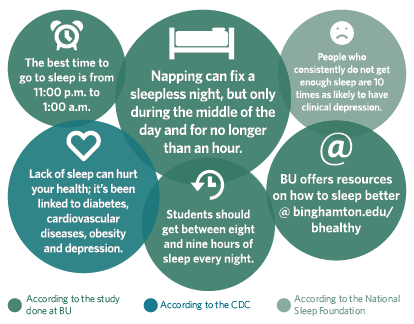
Though an all-nighter may sometimes seem like the best way to tackle finals, experts are learning that losing sleep for a grade can do more harm than good.
The importance of sleep is common knowledge, but a recent Binghamton University study conducted on 100 BU students has found scientific proof. In the study, to be published later this month in the research journal Cognitive Therapy and Research, professor Meredith Coles and psychology Ph.D. candidate Jacob Nota found that sleeping habits, such as how many hours the person sleeps and what time they fall asleep, can lead to an increase in negative thoughts similar to those produced by anxiety disorders, impairing the student’s well-being and ability to absorb information.
“People who slept shorter amounts on average tended to have more worried thoughts, ruminative thoughts and obsessive thoughts,” Nota said. “Those kinds of thoughts probably aren’t going to help you study well for a test.”
The average bedtime of the subjects was about 1:00 a.m., but ranged from 10:00 p.m. to 5:00 a.m. Though it cannot be pinpointed what bedtime directly leads to negative thoughts, Coles and Nota hypothesized that people who went to bed before 1:00 a.m. tended to have fewer pessimistic thoughts than people who went to bed after, gauged by answers the test subjects provided on a questionnaire.
“The research has documented that there will be a change associated with staying up for a whole night for most people,” Nota said. “Messing up your sleep is probably not going to be helpful to doing stuff that college students need to do, like studying for tests and being able to perform during tests. You’re more likely to be preoccupied with these worries and obsessive thoughts.”
Dr. Michael Grandner of the University of Pennsylvania has found in his research that sleep also influences the process of brain rewiring to accommodate new information. While the mind can retain certain information without sleep, it becomes much more difficult.
“You’re not integrating the information,” Grandner said. “You’re trying to learn stuff and it’s not going to happen, because you can read it and understand what you’re reading when you read it, but you can’t really take it and integrate it into your knowledge.”
According to Grandner, adults aged 17 to 22 need eight to nine hours of sleep for prime performance, and less than that affects performance the following day.
“If you’re going to pull the all-nighter, don’t do it the night before the test,” Grandner said. “Do it the night before the night before the test.”
Grandner also mentioned that naps were extremely beneficial after not sleeping well. He said that the prime time for a nap would be in the middle of the day and for no longer than an hour.
According to Nick Allen, a registered sleep technologist at the Lourdes Hospital sleep laboratory, an effect of lack of sleep is excessive daytime sleepiness, or a severe lack of energy.
“They have a harder time staying awake during tests or any kind of class,” Allen said. “That’s where you fall into the excessive daytime sleepiness problem.”
Eileen O’Hara, a sophomore majoring in biology, said she has felt these effects the day after pulling an all-nighter.
“I felt okay at first, but, as the day went on, I started to feel really groggy, even doing simple things,” O’Hara said. “I think people think about the immediate reward of doing well on the test and they want to just cram as much knowledge as they can the night before.”
Mark Stepniewski, a senior majoring in computer science, said that sometimes an all-nighter is just necessary.
“I do have to take a few all-nighters throughout the semester just to catch up on work,” Stepniewski said. “Sometimes you have to take the sacrifice of sleep to study more and get better grades.”


